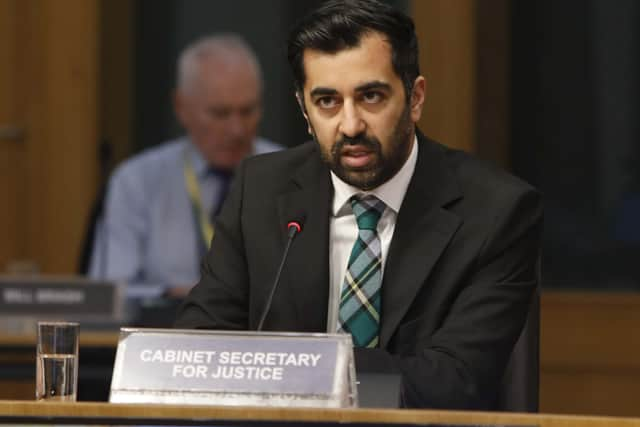Insults uttered during Scottish independence referendum could be prosecuted as hate crime, MSPs warned


The Scottish Government’s draft Hate Crime Bill, currently being scrutinised in Holyrood, could criminalise the “robust exchanges” made between people of opposing political views, MSPs have heard.
Holyrood’s justice committee, taking evidence on the draft Bill from a panel of religious organisations, was told that making it a crime to be racially “insulted” could criminalise many more people than the law intends.
Advertisement
Hide AdAdvertisement
Hide AdKieran Turner, public policy officer with the Evangelical Alliance in Scotland, said his organisation wanted the “word insulting removed” as it could criminalise areas of free speech, including those around nationality and nationalism, rather than just racism.


"This is a very difficult area in terms of different levels of threshold … particularly in terms of insult where that can overlap with political debate, for example independence debates and Brexit, so could insult be used in that scenario.”
He told MSPs that if insulting was to stay in the Bill, there “should be a more specific defence to ensure people don't get caught by mistake”.
Anthony Horan, director of the Catholic Parliamentary Office of the Bishops’ Conference of Scotland, agreed with Mr Turner the “term insulting should be removed, that it's not necessary”.
He said: “I don't think people appreciate what that could criminalise – referenda, for example, attract very robust and sometimes very heated exchanges on the future constitution of the country and it can be a hotbed of insults and all of those could potentially be prosecuted under this provision. This legislation needs to be alive to that.”
David Bradwell, associate secretary of the Church of Scotland's Faith Impact Forum, said there needed to be a freedom of expression exception made for the right to insult and cause offence. But he added “it's where you draw the line” and suggested race should not receive greater protection in the Bill than other protected characteristics.
"The Church of Scotland is in quite a privileged position in that we're not often on the end of hate crime, but within our membership we will have people who are disabled, elderly or LGBT who will have a question about why race is being treated differently and exploring the reasons for that would be useful,” he said.
MSPs also heard concerns from the panel that the characteristic of sex was not included in the Bill. Neil Barber of the National Secular Society said that "putting out a message” using law “was useful, but we must remember that people will take that message and employ it to their own ends”.
Advertisement
Hide AdAdvertisement
Hide AdMr Turner added: “If this Bill is seeking to consolidate and make clear different areas in relation to hate crime and to follow the characteristics in the Equality Act, it does seem very striking that sex is not part of that, particularly given the culturally contested conversations that are ongoing such as around the Gender Recognition Act and reform of that.
"It does seem that one aspect of that in relation to gender identity is covered in this Bill and given protection and the other aspect in relation to biological sex is not covered by the Bill.”
Isobel Ingham-Barrow, head of policy with Muslim Engagement and Development, said it did not make sense for sex to be excluded and there needed to be “greater discussion of how abuse against different characteristics intersects.
She used the example of transphobia, which she said was “a gendered phenomenon where misogyny definitely plays into some of the attacks we see, and women are also overwhelmingly the victims of hate crime against Muslims, so there needs to be understanding of the intersection of hatred”.
Rev. Stephen Allison, assistant clerk to the Free Church of Scotland’s General Assembly, said: “The exclusion of sex with the inclusion of transgender does create a hierarchy that says one is more valuable … and the lack of a free speech clause around gender plays into that, so there's a lot to be said for sex to be treated on the same level.”
MSPs were also told the changes to the Bill recently announced by justice secretary Humza Yousaf to the proposed offence of stirring-up hatred were a "retrograde" step. In September, Mr Yousaf said he would change the threshold from "likely" to stir up hatred to "intent only".
Ephraim Borowski, director of the Scottish Council of Jewish Communities, said this could provide a defence in cases of Holocaust denial. “I think that the amendment that was announced by the Cabinet Secretary is retrograde, it essentially provides a get-out-of-jail-free card for something that you'll see very often in hate-filled posts on the internet.
"That people having posted their hatred will end their comments with 'just saying' or 'just asking'. They are now given a get-out-of-jail-free card because they could just say 'oh, we didn't intend to cause offence, we were merely asking a question about whether the Holocaust happened'."
Advertisement
Hide AdAdvertisement
Hide AdHe added: "Unfortunately anti-Semitism is very much on the rise these days and I take the view, therefore, that it's the victim who needs protected. Yes, freedom of speech is important. But there's a balancing exercise that needs to be done. The right to free speech is not unqualified."
Committee convener Adam Tomkins said Mr Borowski's comments were "quite a different perspective" to the other evidence they had heard over past weeks.
Others expressed concerns about the definition of "inflammatory" material under the new law, with fears certain religious texts could be caught up in it.
Mr Horan said: "We've given the example before of the Catholic understanding of the human person and the belief that gender is not fluid and changeable. And that might be something that could be considered inflammatory by some people and lead to a police investigation."